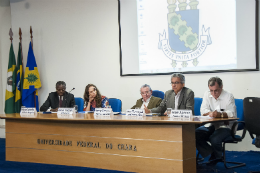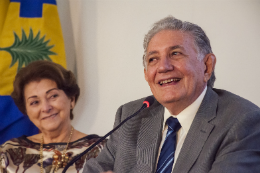Seminar features exchange of experiences in community health between Brazil and Africa
Notícia publicada em:
- 21 de Dezembro de 2016
 The experiences in the implementation of the program of Health Agents in Angola and connections to the practice carried out in Brazil were the themes of the I Seminar Development, Inequality and International Cooperation in Health held on Monday (19th), in the Auditorium of the Rectory of Federal University of Ceará (UFC). In addition to the lectures, the excited crowd watched the release of the book The sanitarians from Jucás and the health agent, which honors Carlile Lavor and Miria Campos Lavor, doctors who marked the history of public health in Ceará.
The experiences in the implementation of the program of Health Agents in Angola and connections to the practice carried out in Brazil were the themes of the I Seminar Development, Inequality and International Cooperation in Health held on Monday (19th), in the Auditorium of the Rectory of Federal University of Ceará (UFC). In addition to the lectures, the excited crowd watched the release of the book The sanitarians from Jucás and the health agent, which honors Carlile Lavor and Miria Campos Lavor, doctors who marked the history of public health in Ceará.
The Dean Henry Campos spoke of the honor of the Federal University of Ceara in hosting the event and highlighted the need to fight for the maintenance and expansion of the achievements in recent years in the Brazilian public health system. Also highlighted the commitment that Brazil has with the countries of Africa. “We should, therefore, take advantage of these opportunities for cooperation, especially with the African countries of Portuguese language”, he said.
Click here to see other pictures of the event on Flickr of the UFC
The exchange of experiences was built through the Panel “Inequalities in health and the health agent”. The independent consultant of the Ministry of Health of Angola and former consultant of the United Nations Children’s Fund (Unicef), Nkanga Guimarães, presented the process of implementation of health agents in his country and assessed the progress and challenges of the program, which had the inspiration of the Brazilian model. Angola is a country with 25 million inhabitants, of which 36.6% live below the poverty line. Diseases such as malaria, yellow fever and diarrhea are the biggest health challenges in the country. However, according to him, even with several problems to overcome, agents have managed to bring the population nearer the public health system.
Camila Giugliani, whose doctoral research, from the Federal University of Rio Grande do Sul (UFRGS), was about the implementation of the community health program in Angola, said that agents have increased the demand of the population for the public health system. “That, on the one hand, is good. But, on the other hand, has shown that the responsiveness of the system still was shorter of the expected’, she concluded.
 The Advisor to Fiocruz Brasilia and former Minister of Health, José Agenor Álvares, also composed the table of the Seminar. “This is the time to reaffirm that the State is responsible for health services in the country”, he pleaded. He highlighted the struggle of sanitarians Carlile and Miria Lavor for a quality public health system and stated that this courage is now required of all.
The Advisor to Fiocruz Brasilia and former Minister of Health, José Agenor Álvares, also composed the table of the Seminar. “This is the time to reaffirm that the State is responsible for health services in the country”, he pleaded. He highlighted the struggle of sanitarians Carlile and Miria Lavor for a quality public health system and stated that this courage is now required of all.
BOOK RELEASE– Co-author of the book about the sanitarians, along Janete de Castro, the Coordinator of the Center for Bioethics and Diplomacy Studies in Health (Nethis) and former aide of the Pan American Health Organization (Paho), José Paranaguá de Santana, spoke of the difficulty and the pleasure of producing the work, which took 14 years to be completed. “It’s a trilogy that tells the vision of health that started in Planaltina, Goiás, and came to be sanitarians in Jucás, here in Ceará, to build the health agent program in the State,” he explained, referring to the honored couple.
Carlile and Miria Lavor thanked, excited, to the authors of the book and talked about the experience of working in public health in Ceará. “The backcountry believes the crises pass and we should expect something better ahead. That hope must move”, said Carlile. The book The sanitarians from Jucás and the health agent is available in virtual version and should soon be released in print.
The I Seminar Development, Inequality and International Cooperation in Health was held by Nethis – Center for Bioethics and Diplomacy Studies in Health – of the Oswaldo Cruz Foundation (Fiocruz) in Brasilia. It had the sponsorship of the Coordenação de Aperfeiçoamento de Pessoal de Nível Superior (Capes).
Source: Federal University of Ceará.
Photos: Federal University of Ceará (UFC)




